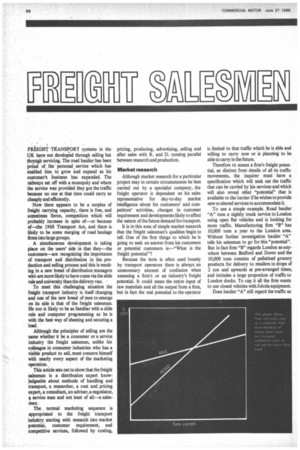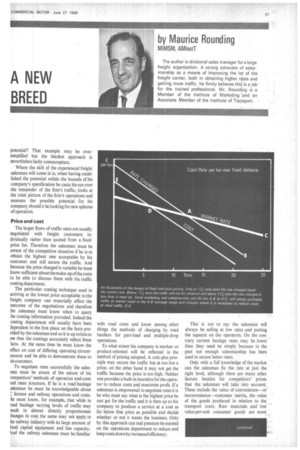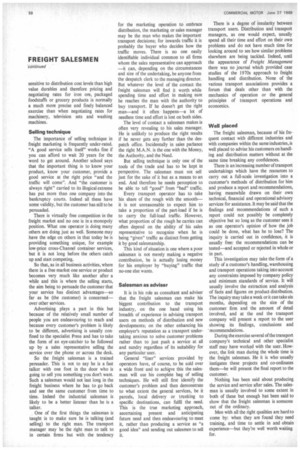- 10 11 IL L I
Page 58

Page 59

Page 60

If you've noticed an error in this article please click here to report it so we can fix it.
MIkfiR
FREIGHT TAANSPORT systems in the UK have not developed through selling but throtigh servicing. The road haulier has been proud of, the personal service which has enabled him to grow and expand as his customer's business has expanded. The railways set off with a monopoly and where the service was provided they got the traffic because no one at that time could carry as cheaply and efficiently.
Now there appears to be a surplus of freight carrying capacity, there is free, and sometimes fierce, competition which will probably increase in spite of—or because of—the 1968 Transport Act, and there is likely to be some merging of road haulage firms into large groups.
A simultaneous development is taking place on the users' side in that they—the customers—are recognizing the importance of transport and distribution in the production and selling process and this is resulting in a new breed of distribution managers who are more likely to have come via the slide rule and university than the delivery van.
To meet this challenging situation the freight transport industry is itself changing and one of the new breed of men to emerge on its side is that of the freight salesman. He too is likely to be as familiar with a slide rule and computer programming as he is with the best way of sheeting and securing a load.
Although the principles of selling are the same whether it be a consumer or a service industry the freight salesman, unlike his colleague in consumer industries who has a visible product to sell, must concern himself with nearly every aspect of the marketing operation.
This article sets out to show that the freight salesman is a distribution expert knowledgeable about methods of handling and transport, a researcher, a cost and, pricing expert, a consultant, an adviser, a negotiator, a service man and not least of all—a salesman.
The , normal marketing sequence is appropriated to the freight transport industry starting with research into market potential, customer requirement, and competitive services, followed by costing, pricing, producing, advertising, selling and after sales with R. and D. running parallel between research and production.
Market research
Although market research for a particular project may in certain circumstances be best carried out by a specialist company, the freight operator is dependent on his sales representative for day-to-day market intelligence about his customers' and competitors' activities, changes in customer requirement and developments likely to affect the nature of the future demand for transport.
It is in this area of simple market research that the freight salesman's qualities begin to tell. One of the first things to which he is going to seek an answer from his customers or potential customers is—"What is the freight potential"?
Because the term is often used loosely by transport operators there is always an unnecessary amount of confusion when assessing a firm's or an industry's freight potential. It could mean the entire input of raw materials and all the output from a firm, but in fact the real potential to the operator is limited to that traffic which he is able and willing to carry now or is planning to be able to carry in the future.
Therefore to assess a firm's freight potential, as distinct from details of all its traffic movements, the inquirer must have a specification which will seek out the traffic that can be carried by his services and which will also reveal other "potential" that is available to the carrier if he wishes to provide new or altered services to accommodate it.
To use a simple example. Road haulier "A" runs a nightly trunk service to London using open flat vehicles and is looking for more traffic. Manufacturing firm "B" has 10,000 tons a year to the London area. Without further investigation haulier "A" tells his salesman to go for this "potential". But in fact firm "B" regards London as anywhere between Bedford and Dover and the 10,000 tons consists of palletized grocery products for delivery to retailers in drops of 2 ton and upwards at pre-arranged times, and includes a large proportion of traffic to London docks. To cap it all the firm wants to use closed vehicles with Joloda equipment.
Does haulier "A" still regard the traffic as potential? That example may be oversimplified but the blanket approach is nevertheless fairly commonplace.
Where the skill of the experienced freight salesman will come in is. when having established the potential within the bounds of his company's specification he casts his eye over the remainder of the firm's traffic, looks at the total picture of the firm's operations and assesses the possible potential for his company should it be looking for new spheres of operation.
Price and cost
The larger flows of traffic rates are usually negotiated with freight customers individually rather than quoted from a fixed price list. Therefore the salesman must be aware of the competitive situation if he is to obtain the highest rate acceptable by his customer and still secure the traffic. And because the price charged is variable he must know sufficient aboutthe make-up of the costs to be able to discuss them with his traffic costing department.
The particular costing technique used in arriving at the lowest price acceptable to the freight company can materially affect the outcome of the negotiations and therefore the salesman must know when to query the costing information provided. Indeed the osting department will usually have been iependent in the first place on the facts provided by the salesman and so it is up to him to ;ee that the costings accurately reflect these 'acts. At the same time he must know the effect on cost of differing operating circum;tances and be able to demonstrate these to 'us customer.
To negotiate rates successfully the salesnan must be aware of the nature of his :ompetitors' methods of operation and costs ind rates structure. If he is a road haulage ;alesman he must be knowledgeable about 7 licence and railway operations and costs. -le must know, for example, that while in .oad haulage varying levels of traffic may esult in almost directly proportionate :hanges in cost the same may not apply in he railway industry with its large amount of ixed capital equipment and line capacity. knd the railway salesman must be familiar
with road costs and know among other things the methods of charging by road hauliers for part-load and multiple-drop operations.
To what extent his company is marketor product-oriented will be reflected in the method of pricing adopted. A cost-plus principle may secure the traffic but at too low a price; on the other hand it may not get the traffic because the price is too high. Neither one provides a built-in incentive for the operator to reduce costs and maximise profit. If a salesman is empowered to negotiate rates it is he who must say what is the highest price he can get for the traffic and it is then up to his company to produce a service at a cost as far below that price as possible and decide whether or not it wants the business. Only by this approach can real pressure be exerted on the operations department to reduce and keep costs down by increased efficiency. This is not to say the salesman will always be selling at low rates and putting the squeeze on the operators. On the contrary current haulage rates may be lower than they need be simply because in the past not enough salesmanship has been used to secure better rates.
Only with a full knowledge of the market can the salesman fix the rate at just the right level, although there are many other factors besides his competitors' prices that the salesman will take into account. These include the value of convenience—or inconvenience—customer inertia, the value of the goods produced in relation to the transport costs. Raw materials and low value-per-unit consumer goods are more sensitive to distribution cost levels than high value durables and therefore pricing and negotiating rates for iron ore, packaged foodstuffs or grocery products is normally a much more precise and finely balanced exercise than when negotiating rates for machinery, television sets and washing machines.
Selling technique The importance of selling technique in freight marketing is frequently under-rated. "A good service sells itself" works fine if you can afford to wait 20 years for the word to get around. Another school says that the important thing is to know your product, know your customer, provide a good service at the right price "and the traffic will come". And "the customer is always right" carried to its illogical extreme has put more than one company into the bankruptcy courts. Indeed all these have some validity, but the customer has still to be persuaded.
There is virtually free competition in the freight market and no one is in a monopoly position. What one operator is doing many others are doing just as well. Someone may have the edge on others in that today he is providing something unique, for example low-price cross-Channel container services, but it is not long before the others catch up and start competing.
So that, as in all business activities, where there is a free market one service or product becomes very much like another after a while and this is where the selling starts, the aim being to persuade the customer that your service has distinct advantages—so far as he (the customer) is concerned— over other services.
Advertising plays a part in this but because of the relatively small number of people you are endeavouring to reach and because every customer's problem is likely to be different, advertising is usually confined to the specialist Press and has to take the form of an eye-catcher to be followed up by a sales representative selling the service over the phone or across the desk.
So the freight salesman is a trained persuader. This is not to say he is a fast talker with one foot in the door who is going to sell you something you don't want. Such a salesman would not last long in the freight business where he has to go back and see the same customer from time to time. Indeed the industrial salesman is likely to be a better listener than he is a talker.
One of the first things the salesman is taught is to make sure he is talking (and selling) to the right man. The transport manager may be the right man to talk to in certain firms but with the tendency for the marketing operation to embrace distribution, the marketing or sales manager may be the man who makes the important transport decisions; for inwards traffic it is probably the buyer who decides how the traffic moves. There is no one easily identifiable individual common to all firms whom the sales representative can approach —it can, depending on the circumstances and size of the undertaking, be anyone from the despatch clerk to the managing director. But whatever the level of the contact. the freight salesman will find it worth while spending time and effort in making sure he reaches the man with the authority to buy transport. If he doesn't get the right man—and it often happens—a lot of needless time and effort is lost on both sides.
The level of contact a salesman makes is often very revealing to his sales manager. He is unlikely to produce the right results if he never gets any further than the despatch office. Incidentally in sales parlance the right M.A.N. is the one with the Money, the Authority, and the Need.
But selling technique is only one of the tools of the trade and has to be kept in perspective. The salesman must not sell just for the sake of it but as a means to an end. And therefore he needs perception to be able to tell "good" from "bad" traffic.
Every transport operator has to take his share of the rough with the smooth— it is not unreasonable to expect him to take a proportion of the part-load if he is to carry the full-load traffic. However, what proportion of the rough he carries can often depend on the ability of his sales representative to recognize when he is being "given" traffic as distinct from getting it by good salesmanship.
This kind of situation is one where a poor salesman is not merely making a negative contribution, he is actually losing money for his employer by "buying" traffic that no-one else wants.
Salesman as adviser It is in his role as consultant and adviser that the freight salesman can make his biggest contribution to the transport industry, on the one hand using his breadth of experience in advising transport users on methods of distribution and new developments; on the other enhancing his employer's reputation as a transport undertaking anxious to solve customer problems rather than to just push a service at all and sundry regardless of its suitability for any particular user.
General "liner" services provided by operators have, of course, to be sold over a wide front and to achigve this the salesman will use his complete bag of selling techniques. He will still first identify the customer's problem and then demonstrate to what extent the general services, be it parcels, local delivery or trunking to specific destinations, can fulfil the need. This is the true marketing approach, ascertaining present and anticipating future need and then endeavouring to meet it, rather than producing a service as "a good idea" and sending out salesmen to sell it. There is a degree of insularity between transport users. Distribution and transport managers, as one would expect, usually spend all their time and effort on their own problems and do not have much time for looking around to see how similar problems elsewhere are being tackled. Indeed, until the appearance of Freight Management there was no journal which provided case studies of the 1970s approach to freight handling and distribution. None of the various transport associations provides a forum that deals other than with the mechanics of operation or the general principles of transport operations and economics.
Well placed The freight salesman, because of his frequent contact with different industries and with companies within the same industries, is well placed to advise his customers on handling and distribution matters without at the same time breaking any confidences.
There is an increasing number of transport undertakings which have the resources to carry out a full-scale investigation into a customer's methods of distribution for him and produce a report and recommendations, having meanwhile drawn on their own technical, financial and operational advisory services for assistance. It may be said that the findings and recommendations of such a report could not possibly be completely objective but so long as the customer sees it as one operator's opinion of how the job could be done, what has he to lose? The inquiry is carried out in confidence, it is usually free: the recommendations can be tested—and accepted or rejected in whole or • in part.
This investigation may take the form of a study of a customer's handling, warehousing and transport operations taking into account any constraints imposed by company policy and minimum standards of service. It will usually involve the extraction and analysis of facts and figures on product distribution. The inquiry may take a week or it can take six months, depending on the size of the customer firm and the amount of detail involved, and at the end the transport company will present a report to the user showing its findings, conclusions and ' recommendations.
During the exercise several of the transport company's technical and other specialist staff may have worked with the user. However, the link man during the whole time is the freight salesman. He it is who usually instigates these projects and co-ordinates them—he will present the final report to the customer.
Nothing has been said about producing the service and service after sales. The salesman is usually involved to some extent in both of these but enough has been said to show that the freight salesman is someone out of the ordinary.
Men with all the right qualities are hard to come by: when they are found they need training, and time to settle in and obtain experience—but they're well worth waiting for.


















































































































